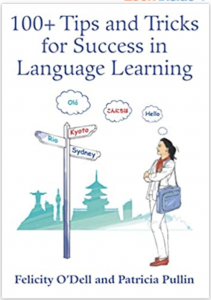Strategies and insights prove useful in acquiring a new language, finds Wayne Trotman

100+ Tips and Tricks for Success in Language Learning
Felicity O’Dell and Patricia Pullin, O’Dell and Pullin, 2020 ISBN: 978-1-8382311-0-1
Understanding little Turkish by the end of a month in Central Anatolia during my first overseas teaching post, I boldly decided to buy all the Sunday newspapers in order to get to grips with what was clearly a very strange language. That would surely do the trick, or so I thought. Alas, after many years of living here, I still have problems. I’m pleased to inform those facing similar predicaments that, with a wealth of foreign-language learning and teaching experience behind them, the authors of this book have put together a supremely useful title. I wish I’d had access to a copy that would have helped smooth my passage all that time ago.
Following the introduction, in which the authors enthuse budding language learners by suggesting how it will sharpen the brain while opening doors and minds, is ‘Making Plans’. Here the reader is asked why they are opting to study the chosen language. For most of us this might be travel, work and culture (and, for those with bigger ambitions, love). As with all sections, the concluding ‘Over to You’ slot lists thought-provoking questions like, “What are the main benefits for you of learning this language?” Also under discussion here are topics such as how good is ‘good enough’, how do people learn foreign languages and what is a good language learner? The authors’ sound advice is to set small achievable goals and fit rewards into personal learning plans.
“Set small achievable goals and fit rewards into personal learning plans”
In ‘Ways of Learning,’ the authors look at how to build regular language learning activities into one’s life, whether to take a language course locally or abroad, and if a private teacher or in a group is the best approach. Also outlined is how to use traditional online resources, such as newspapers and films, plus interactive resources like social media and gaming apps.
The next part concerns language the learner is sure to need, such as survival phrases, among the most important being, “Where is the toilet, please?”, “I’m married” and “I’m allergic to…”. Learning vocabulary and grammar are, of course, key to knowing a language and are covered in separate sections in which there is advice on choosing a dictionary, personalising matters by compiling a scrapbook of common words or phrases, and how to fix lexical items in the memory.
‘Getting to Grips with Grammar’ is covered with due caution, since it’s the area that can become the most time-consuming and complex. Advice here is to learn useful chunks such as, “If I were you…” and “Having said that…”, as both provide the speaker with valuable thinking time.
Learning to listen to and read the target language, and ensuring those being addressed can understand early utterances are the concerns of the next two sections. Aims in ‘Improving Understanding’ include how different approaches to reading can affect progress, plus how to make best use of learning with a tandem partner. ‘Sounding Good’ looks at, among several other key matters, why it’s useful to decide how good you want or need your pronunciation to be. Surely the most helpful subsection here is that on using drama, songs and poetry to overcome the shyness and inhibition most of us feel when starting out on a new language. ‘Beyond Individual Sounds’ includes getting to grips with stress and intonation. Turkish, for example, helpfully places equal stress on each syllable. This is not so in English, of course.
Taking stock of progress and making learning stick are the next areas in focus. A basic awareness of the band descriptors in the Common European Framework of Reference (CEFR) will enable any language learner to locate just where they stand. I noticed that I’m still at B1 level in Turkish – lower intermediate – even after so many years! Maintaining motivation is vital if band movement is to be upward, however, and this can be increased by getting involved in free online gaming, signing up for electronic newsletters and following drama series on TV.
Beyond actual words, there are cultural aspects to consider when approaching a foreign language, such as notions of what is and isn’t polite. It’s especially important to be aware of how to greet people, how to accept gifts and to know what others might find culturally offensive, like blowing one’s nose in public. The final section of this title includes tips from 17 foreign language learners who each provide key insights into their linguistic adventures. Particularly amusing here are their anecdotes on how things sometimes came out wrong. I must admit to having read this section first!

Wayne Trotman is a teacher educator at Izmir Katip Çelebi University, Izmir, Turkey.





